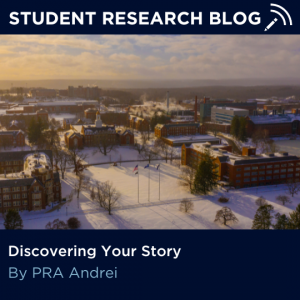By Andrei Abarientos, Peer Research Ambassador
 One of the most important lessons that I learned as a researcher is that your research (and your experiences with it) is a story. One of the most important things you can do as an undergraduate to prepare for your future is to reflect and understand your own path, and how your research plays into that. Hand-in-hand with that is being able to effectively craft a narrative, which is crucial anytime you are explaining yourself, your work, and your career. Whether you’re studying molecular processes, supermassive black holes, or social issues, placing your work into a larger context and effectively articulate your path is a major pillar of being a researcher. In large presentations, interviews, applications, or even just small-talk with colleagues, having a mastery of storytelling is an oft-overlooked skill of a scientific or investigative career. There’s a myriad of ways to go about this, but here are a few steps to crafting your story that I’ve picked up through experience and through listening to others:
One of the most important lessons that I learned as a researcher is that your research (and your experiences with it) is a story. One of the most important things you can do as an undergraduate to prepare for your future is to reflect and understand your own path, and how your research plays into that. Hand-in-hand with that is being able to effectively craft a narrative, which is crucial anytime you are explaining yourself, your work, and your career. Whether you’re studying molecular processes, supermassive black holes, or social issues, placing your work into a larger context and effectively articulate your path is a major pillar of being a researcher. In large presentations, interviews, applications, or even just small-talk with colleagues, having a mastery of storytelling is an oft-overlooked skill of a scientific or investigative career. There’s a myriad of ways to go about this, but here are a few steps to crafting your story that I’ve picked up through experience and through listening to others:
Recognize Your Journey: Whether you’re just beginning to look for research or you’ve been in a lab for years, everyone has had a period of growth that has led them to their place. Recall your most memorable experiences in the lab, victories or defeats alike. What did they teach you? How are you different now from when you started? This can look like a lot of things, from technical and intellectual aptitude to gaining resilience or emotional intelligence. Realizing your starting point and your present self—in other words, the skills and perspectives you gained—can serve you well in crafting your story.
Know Your Spark: What gets you excited about your research? Is it the ability to make a difference clinically, or socially? Maybe it’s the feeling of investigating something that’s never been looked at before, or maybe it empowers a marginalized community. You might just have a particular fondness for the organism which you study. Regardless of what your motivation is, there’s likely something particular about your work that thrills you. Going parallel with the age-old question, “what is important about your research?” is the more subtle ask: “why does your research matter to you?”
Prophesize Your Ideal Future: I am by no means the person to claim that he has a 100% plan for his future. In fact, my plan is ever-constantly changing and being formed. But many people have a rosy vision of a dream career, which will inevitably be compromised by pesky real-world obligations like supporting family or debt or location. For your story, however, it can be helpful to allow yourself to envision this ideal, where you have your cake and eat it too. Without thinking of reality, what is your job that checks every single box perfectly? It doesn’t need to be realistic; this is not a binding plan. Rather, it allows you to reflect on the skills you want to acquire and the general path you want to gravitate towards.
Talk To Others: If there is one thing that all investigators in any field share, it is a deep love of talking about their research and their path. Take time to talk to others, be it your PI, PhD students, or other undergraduate lab mates. Learning other’s stories helps you recognize commonalities or differences, refine your own storytelling, and has the added benefit of letting you connect with researchers around you in a more personal way.
Storytelling is a subtle and often ignored skill of science, but when done effectively can mean a world of difference. I’ve used steps like these to convey my own story in a range of settings, from interviews to applications to research presentations, and even in my previous blog post! While it’s not something to follow to a T, these steps can be helpful in figuring out what to emphasize about yourself and your journey.
Andrei is a junior majoring in Pathobiology. Click here to learn more about Andrei.